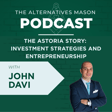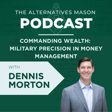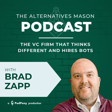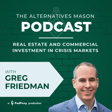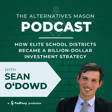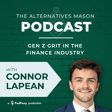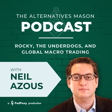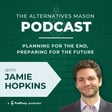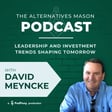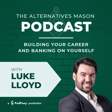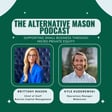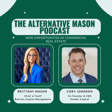
The Alternatives Mason: Building Alts Knowledge Brick by Brick | Episode 7 | The Evolution of the 60-40 Featuring Dan Harms
Welcome to The Alternatives Mason: Building Alts Knowledge Brick by Brick. Banrion Capital Management uses technology to help independent advisors scale and educate themselves on alternative investments. Since education is such a big piece of the Banrion mission and business, we are excited to kick off this series to dive into the nits and grits of the alternatives space. Episode 7 "The Evolution of the 60-40" Features Dan Harms.
Dan Harms is Founder and CEO of Third Wire Asset Management. Third Wire Asset Management provides turn-key risk managed alternative investment portfolios for accredited investors built with advisors in mind. Brittany and Dan discuss the importance of providing advisors access and education for alternative investments.
In addition to being the CEO & Co-founder of Third Wire Asset Management (TWAM). Dan is also Co-chair of the TWAM Investment Committee. Having spent 19 years in various wealth management roles, Dan leads TWAM with a deep knowledge base of portfolio construction & alternative investments, along with a healthy dose of cynicism toward wirehouses.
Prior to founding TWAM, Dan operated a proprietary trading platform across 40+ futures markets. Additionally, Dan was a Partner and Co-founder of a Chicago-based independent RIA, a firm with expertise in providing wealth management for ultra high net worth clients. He has also led a $140mm single family office, managing both sides of the balance sheet, which primarily focused on high-end investment management, complex estate planning, and tax strategy. Dan began his career in wealth management at Smith Barney advising high net worth families while also conducting equity research & trading for a resident portfolio manager.
Connect with Dan on LinkedIn: Daniel Harms
Learn More About Banrion: Banrion Capital Management
Follow Brittany on 𝕏: @Brittany_Mason
Follow Banrion on 𝕏: @Banrion_Capital
Subscribe to our YouTube Channel: @QueenofAlts
Important Disclosures:
The opinions expressed on the “The Alternative Mason Podcast” are for general informational purposes only and are not intended to provide specific advice or recommendations for any individual or on any specific security.
It is only intended to provide education about the financial industry. To determine which investments may be appropriate for you, consult your financial advisor prior to investing. Any past performance discussed during this program is no guarantee of future results.
The guests featured on this program may be participants on Banrion Capital Management’s platform. As such Banrion may receive payment for their participation as a platform partner.
Any indices referenced for comparison are unmanaged and cannot be invested into directly. As always please remember investing involves risk and possible loss of principal capital; please seek advice from a licensed professional.
Investments are not FDIC-insured, nor are they deposits of or guaranteed by a bank or any other entity, so they may lose value.
Investors should carefully consider investment objectives, risks, charges and expenses. This and other important information is contained in the fund prospectuses and summary prospectuses, which can be obtained from a financial professional and sho

